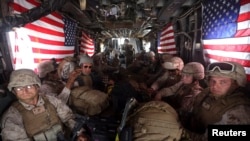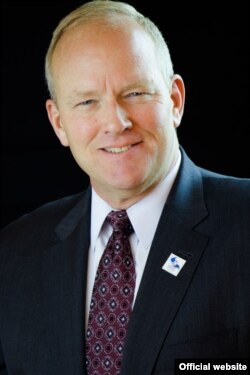Col. David Sutherland served in the U.S. Army for 29 years, commanded the U.S. combat brigade in Diyala Province, Iraq, and served as special assistant to the chairman of the Joint Chiefs of Staff (2009-2012) with a focus on warrior and family support. He is the chairman of Easter Seals Dixon Center, one of 16 veterans service organizations (VSOs) to be highlighted at "THE CONCERT OF VALOR" this Veterans Day. Col. Sutherland spoke to Now host David Byrd about some of the issues veterans face as they go from the battlefield to home.
BYRD: What are some of the struggles that veterans are facing when they make that transition from military to civilian life?
SUTHERLAND: It’s important to understand first that you can’t talk about our veterans without talking about our military families as well. So it’s not just us that serve in combat, but it’s our families who are so strong, brave, and resilient and also come home at the same time that the service member is. And the needs of both the veterans and the military families are evolving; they are not disappearing. So what we went through in challenges coming home to a disconnection in 2006-2007 now what we are seeing in 2014 and what we will see in the future is the needs evolving and not disappearing. And the other part is it’s going to happen at a time when the wars are receding from the minds of the American people. So that disconnect is probably what we have to look at more than anything: how do we bridge that disconnect between the military and civil society so they understand not only what we are as veterans and military families but who we are.
BYRD: How do you think the business public needs to be made aware of the unique skills veterans have?
SUTHERLAND: This is something that we’ve gone through for the past several years. When I made the comment about the American people know what we are but they may not know us, it goes to that specifically with HR professionals: understanding the skill sets that these phenomenal young men and women bring home with them. And business hails these skills that veterans possess: accelerated learning curve, leadership, teamwork, efficient performance under pressure, and respect for procedures. All of these different aspects of our culture in the military that we bring home to improve the bottom line of our businesses. And probably one of the most significant is the triumphing over adversity, recognizing their ability to deal with difficult circumstances and turn the negative into positive.
BYRD: Post Traumatic Stress Disorder (PTSD) is mentioned a lot when discussing the wars in Iraq and Afghanistan, particularly because of the prevalence in those wars of IEDs (improvised explosive devices) and traumatic brain injury. What resources are available for veterans? There is a transition assistance program in the Department of Defense, but what medical resources are available for veterans and their families when dealing with something like that?
SUTHERLAND: Well understand that war is vile. It is one of the vilest things that you can imagine. And yet what helps us survive on the battlefield -- anger, paranoia, hyper-vigilance, sleeplessness – all of these things are normal human reactions to being put into that vile situation. And when we come home, they don’t just turn off. Those life experiences don’t just turn off. The other piece is understanding that the number one remedy for dealing with the effects of these are feeling like you fit in, feeling connected, feeling like you’re not different. And so, it’s not just the medical – removing the pathology and listening to those who have served, listening to their stories and their experiences. But then when you look at community based services, and that’s what it really comes down to, community based services, not necessarily creating new programs but taking what exists already within the VA, within departments and agencies, faith based organizations, health care providers across the country where nurses and doctors will ask the patient ‘did you serve?’ And then recognize the impact of that combat experience on them and are they moving on with life, are they socializing and being part of life, those are the challenges. And then creating that no wrong doors approach locally that connection with them. But understand that if you have met a veteran, you have met a veteran. Each one of us is unique; each one of us may have challenges and each one of us may have different solutions. We have seen equine therapy, animal therapy, and other things really having a great impact, including creative arts.
BYRD: What role do other veterans as mentors or counselors play in helping veterans come back into civilian life?
SUTHERLAND: Again it goes back to the ‘if you’ve met a veteran, you’ve met a veteran. We’re all unique. And understanding and listening to the veteran – listening to their stories, allowing them to talk, allowing them to come in and feel like they fit in is what mentors understand. A mentor is – let’s change it let’s make it about a protégé program. Protégés are people that I as a mentor am there to help succeed in life – networking them, connecting, advocating for them but also looking for local community-based services and supports that organizations like Easter Seals provide that looks at the solution and then connects them to the resources, them being the veterans and their families.
BYRD: The struggles of the Veterans Administration have been in the news recently – the Secretary of the VA was replaced. But do you think that as the wars, as you said, fade from the public eye, that the needs of veterans and the unique struggles that they have will continue to be dealt with in the public arena? Or do you think that they, sadly, could almost be forgotten?
SUTHERLAND: Well, I’m not going to tolerate another generation of homeless veterans. And I know that you aren’t either. And so what we have to do is we have to continue to build public awareness, we have to encourage community involvement and promote community-based services that are really connecting to the unique needs (of veterans). There are just some things that government can’t do that independent organizations working together locally can. And the most important part is the compassionate outreach and recognizing the unique capabilities and their potential for greatness. What they have done on the battlefield is amazing and the potential of what they will do for our society for years to come will even astound those greatest advocates for them.
BYRD: What can we do to remove the stigma that somehow Iraq and Afghanistan veterans are somehow damaged or worse than veterans of other wars? What are some concrete steps that HR managers or people in the public need to take in order to do that?
SUTHERLAND: The first is when we come home, it’s not our heads that are broken, in many cases it’s our hearts that are broken. We’ve seen things that most 18, 19, 20, -- or 53-year-olds should never experience in life. And so allowing them to come back on their terms, encouraging them, like I talked about the number one remedy is feeling like you fit in so listening and really connecting with them in meaningful ways, local leaders at the community level connecting with them. I fought for my family, my neighbor, and my community; I come home to my family my, my neighbor, my community. I don’t come home to big government organizations. And so it really comes down to enabling them in education, meaningful employment, and information and options for health care. Information and options could be everything from athletics and recreation, to recognizing their skill sets, and what they want to do. They just want to own a piece of the rock. The same thing we all do when we come home. And so we are seeing trade organizations doing the credentialing and licensing – the Teamsters and Utility Workers – and then connecting them to meaningful employment. But it really does come down to that triad of enabling them an education, meaningful employment, and access to health care. But understand, I am a veteran, not a victim. And this isn’t about pity. It’s about recognition of their potential and that connection for a hand up, but not a hand out.
BYRD: What are some the unique struggles that you think female veterans face when they get back home?
SUTHERLAND: Yeah, the unique thing about female veterans is females are really having challenges because of divorces – they are four times as likely to be divorced. And female veterans bring children with them. And when I said that we will not tolerate another generation of homeless veterans, we are not going to tolerate their children being homeless either -- and the increased number of unemployment among female veterans, the challenge of homelessness, and the impact on their children. We have to recognize that our female veterans have served in combat, too. And their unique needs and their unique challenges – also to address things like military sexual trauma. We have to be open, honest, and candid and realize that, again, their challenges are unique, and we have to address those at the community based level with services that already exist. Harnessing those community based services and then tying those to all that have served while recognizing the unique needs of our female veterans.
BYRD: Is there anything we left out about this issue?
SUTHERLAND: First understand that these are phenomenal young people and they will make tremendous differences in communities across the nation. On every socio-economic indicator, our veterans are reimaging local and they are making tremendous positive impacts locally. But we have to recognize that as they come home and we forget about the wars, we cannot forget about our veterans, our military families, and the families of the fallen.





